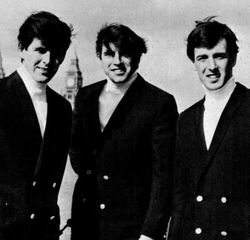The Bachelors
Irish pop group From Wikipedia, the free encyclopedia
The Bachelors were a popular music group, originating from Dublin, Ireland, but primarily based in the United Kingdom. They had several international hits during the 1960s, including eight top-ten singles in the UK between 1963 and 1966.
The Bachelors | |
|---|---|
 The Bachelors in 1966 | |
| Background information | |
| Origin | Dublin, Ireland |
| Genres | |
| Years active | 1957–present |
| Labels | Universal, Decca, Philips, Pickwick, London, Galaxy, Deram and others |
| Members | Disputed – see article |
| Past members | Conleth (Con) Cluskey Declan (Dec) Cluskey John Stokes |
| Website | Con & Dec the Bachelors John Stokes' the Bachelors |
Career
Summarize
Perspective
The founding members of the group were Conleth (Con) Cluskey (18 November 1935 – 8 April 2022), his younger brother Declan (Dec) Cluskey (born 23 December 1941), and their friend John Stokes (Sean James Stokes) (born 13 August 1936). They formed their first band together in 1957: "The Harmonichords" (also seen as "The Harmony Chords"), a classically styled instrumental harmonica-act.
As the Harmonichords, they appeared on Hughie Green's Opportunity Knocks on Radio Luxembourg[1] and on The Ed Sullivan Show St. Patrick's Day special (filmed in Dublin, broadcast 15 March 1959), in which they played "Danny Boy".[2] They also played background music plus featured pieces in a 25-week radio comedy series called Odd Noises on Radio Éireann, which featured Eamonn Andrews.[1] In 1960, they changed their name to the Bachelors at the suggestion of Dick Rowe, A&R at Decca Records, who reportedly recommended the name "because that's the kind of boy a girl likes".[3]
During the 1960s, they had many successful songs in music charts in Europe, Australia, South Africa, South America, parts of the USSR, and the United States. Some of the most successful were "Charmaine" (1963); "Diane", "I Believe" (1964), "Ramona" and "I Wouldn't Trade You for the World" (1964); "Marie" (written by Irving Berlin) and "In the Chapel in the Moonlight" (1965). In 1965 they had the 'most played juke box track' with "The Stars Will Remember", from the film "It's all over town". Their last big hit in the UK was a cover of the Paul Simon song "The Sound of Silence" which reached No. 3 in April 1966.
Live work carried them into the 1970s with record-breaking theatre season shows. After a successful end to the 1960s with the album World of the Bachelors hitting the top 10 in 1968, the band became less and less dominant in the changing music industry. They remained successful recording artists and moved to the Philips label, which contracted easy listening stars such as Val Doonican and The New Seekers. Despite the Bachelors' last chart single being in 1967, they continued to play the cabaret circuit, still maintaining the original line-up until 1984, when there was "a messy split" between the Cluskey brothers and Stokes.[4]
Following the split, the Cluskey brothers appeared as "The New Bachelors" and Stokes as "Stokes & Coe"; Stokes allegedly also then appeared as "The New Bachelors[5] and the Cluskeys performed as "Con & Dec, The Bachelors".
In 2008, a compilation CD I Believe – The Very Best of The Bachelors, featuring the 1960s hits together with two new songs recorded by Con and Dec Cluskey, was released through Universal, which had acquired the Decca catalogue,[6] (available in the US as an import from Uni Classics Jazz UK),[7] reached No. 7 in the UK album chart.[8] Con and Dec Cluskey appeared on TV and radio to promote the album.
Con Cluskey died on 8 April 2022, aged 86. He had been living in Elland, West Yorkshire, since 1970.[9][10]
Film and television
Summarize
Perspective
Throughout the 1960s, the Bachelors racked up hit singles and albums, made guest appearances on all the then-current TV shows,[11] and appeared in two Royal Variety TV shows.[12] In 1963, they starred in It's All Over Town with Frankie Vaughan and The Springfields. The following year they appeared on the TV show Sunday Night at the London Palladium, then hosted by Bruce Forsyth: this episode, according to Paul Gambaccini, achieved the largest viewing audience ever for this very popular show.[12]
The Bachelors appeared in a film in 1964 called Just for You (known as Disk-o-Tek Holiday in the USA), with DJ Sam Costa. In 1965 they made I've Gotta Horse with Billy Fury. In 1971 they starred in a TV situation comedy series called Under and Over playing three Irish navvies working on the London Underground. Six episodes were broadcast on BBC One.[13]
The group began 1970 by appearing on the BBC's highly rated review of the 1960s' music scene Pop Go The Sixties performing "Charmaine" and "Diane" live on the show, which was broadcast on BBC1 on 1 January 1970.
In December 2016, Con and Dec (performing as The Bachelors) appeared in Channel 4's Skeg Vegas, a one-off documentary following Skegness' Number One Entertainment Agent Noel Gee.[14]
In August 2017, Dec appeared as a contestant in Channel 4's Come Dine With Me.[15]
Songs
The Bachelors' version of "Charmaine", with its descending melody that had already made it an evergreen, jogs along to a country guitar strum and a sprinkling of piano licks. Dick Rowe chose American Shel Talmy as record producer, who went on to produce some of The Kinks' classic rock hits. Another 1927 movie theme song, "Diane"—penned by the same songwriters as "Charmaine", Erno Rapee and Lew Pollack, and arranged in the same Nashville-like manner, but produced by Michael Barclay—was released in 1964 and gave the group their biggest international hit, reaching number one in the UK Singles Chart, as well as an American breakthrough at number ten.
Four of their hit songs ("Charmaine", "Ramona", "Marie" and "Diane") were taken from 1920s films. Jim Reeves had also covered the first three of these in the 1950s.
Discography
References
Other sources
External links
Wikiwand - on
Seamless Wikipedia browsing. On steroids.
